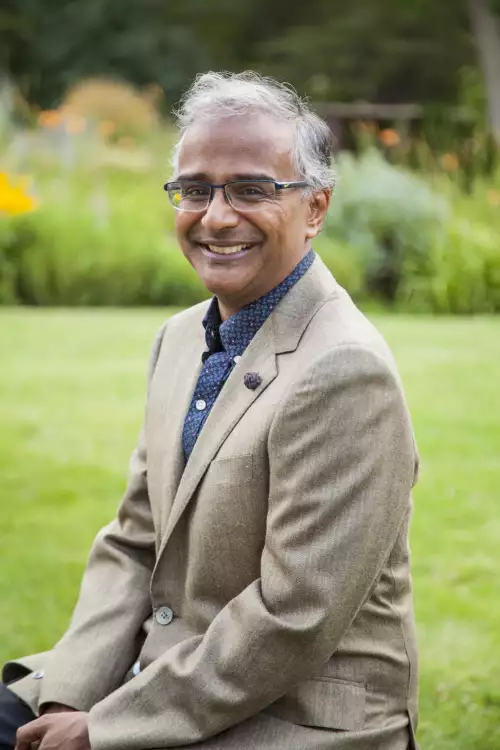 The Data Science Initiative is welcoming its newest faculty member this year.
The Data Science Initiative is welcoming its newest faculty member this year.
Suresh Venkatasubramanian joins DSI and Brown’s Computer Science Department from the University of Utah School of Computing (read more about Suresh). Currently on a layover in the White House’s Office of Science and Technology Policy, Suresh joins us here at Brown full-time next summer, but was here on November 10 to give a talk entitled “Machine Readable: The Power and Limits of Algorithms That Are Shaping Society.” The talk was introduced by Provost Richard Locke, and was for a broad audience. Read the abstract or watch the video.
DSI is a growing interdisciplinary unit, with its core faculty, Executive Committee and Advisory Board, and affiliated faculty coming from a wide range of departments at Brown. A core element of DSI’s mission is an emphasis on studying and teaching data science with an eye to its wider social impacts in all disciplines. Suresh is a wonderful addition to this mix, bringing to DSI a primary interest in the social impacts of the algorithms that increasingly shape the lives of all of us.
We asked Suresh about his research passions, about joining DSI, and about moving to New England from Utah:
What are your hopes/plans for your first year (or few years) at Brown?
My first year at Brown is a whirlwind, since it’s also my first year at the White House. But what I’ve been trying to do is learn more about the university and DSI and prepare our plans for a new Center that tries to bring a societal dimension into computing.
What excites you about being part of the Data Science Initiative?
Data Science has become a unifying language for a broad range of disciplines. I’ve always aspired to be a Renaissance researcher in my work, crossing disciplinary boundaries as needed to solve problems that often require multiple perspectives. The Initiative is the perfect home for that—it’s a nexus for numerous intellectual currents swirling around campus, all centered on the exciting possibilities of using data (and algorithms) to help make sense of problems in different domains.
Your intellectual interests cover a range of topics, from theoretical computer science to being an early mover in algorithmic fairness and the social impact of automated systems. Tell us about the role interdisciplinary interactions have played in your research life.
I’ve moved around my whole life—in fact the first time I spent more than ten years in any location was during my stint at Utah before coming to Brown. I sometimes wonder whether that restlessness is related to the restlessness that characterizes my work. I’ve always felt impatient at being pinned down in one disciplinary tradition, and have found ideas that were fascinating in virtually every area I’ve come in contact with. My training was in theoretical computer science—the mathematical side of CS—and it’s there that I first learned about the power of bringing multiple perspectives to bear on a problem. Initially it was different kinds of mathematics, then different kinds of computer science concepts. And now we are bringing different perspectives from the social sciences to our thinking on data and computing. What I find utterly fascinating is how people in different disciplines formulate quests that characterize their fields. Understanding what makes them tick helps me understand how I can work together with them on problems of mutual interest.
At Brown you plan to build a new center with colleague Seny Kamara and others, focusing on “computer science that truly responds to the needs of people.” What are your goals for the center?
I won’t let out all our secrets just yet! But it’s worth noting that computer science was born in a very different time, when the notion of who could speak about computing—and who computing should speak to—was very different. What would computer science look like if we built it today? How would computer science look if it truly represented and spoke for all?
DSI has recently created a Data Fluency certificate for undergraduates—what do you think data fluency in everyday life should consist of?
More and more, we use the language of data—charts, graphs, and other numerical representations of information—to communicate ideas, tell stories, and even justify the validity of claims. It’s really easy to torture data to tell the story you want to tell. Understanding when these stories are real and when they are merely serving an agenda requires the ability to be critical about data. Expressing concepts numerically is a kind of paradox—we use the most precise language possible, but we also need to encode the imprecision inherent in the use of data. What I think of as data fluency is coming to terms with that paradox and being comfortable with it.
(Bonus question) What are you and your family looking forward to exploring in Providence and New England?
I’ve lived all over the US: on the West coast (where I learnt skiing), in New Jersey and Pennsylvania (where I enjoyed a more urban lifestyle) and Utah (where I came to love the mountains, the glorious skiing, and the outdoors). I know I’m looking forward to living in a town that’s near the ocean, but not right on it—that has its own amazing terrain and wilderness to explore—and that’s close enough to bigger cities that I can get a taste whenever I want to. I know my wife is looking forward to eating real seafood again and experiencing the charms of New England.